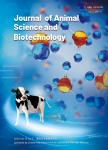Epigenetics and transgenerational inheritance in domesticated farm animals
Epigenetics and transgenerational inheritance in domesticated farm animals作者机构:Center for Reproductive Biology School of Biological Sciences Washington State University
出 版 物:《Journal of Animal Science and Biotechnology》 (畜牧与生物技术杂志(英文版))
年 卷 期:2015年第6卷第2期
页 面:123-129页
核心收录:
学科分类:0710[理学-生物学] 07[理学] 08[工学] 0905[农学-畜牧学] 09[农学] 071007[理学-遗传学] 0836[工学-生物工程] 090501[农学-动物遗传育种与繁殖]
基 金:supported by NIH grants to MKS
主 题:Environment EDiclenetics Pig. Review Transgenerational
摘 要:Epigenetics provides a molecular mechanism of inheritance that is not solely dependent on DNA sequence and that can account for non-Mendelian inheritance patterns. Epigenetic changes underlie many normal developmental processes, and can lead to disease development as well. While epigenetic effects have been studied in well-characterized rodent models, less research has been done using agriculturally important domestic animal species. This review will present the results of current epigenetic research using farm animal models (cattle, pigs, sheep and chickens). Much of the work has focused on the epigenetic effects that environmental exposures to toxicants, nutrients and infectious agents has on either the exposed animals themselves or on their direct offspring. Only one porcine study examined epigenetic transgenerational effects; namely the effect diet micronutrients fed to male pigs has on liver DNA methylation and muscle mass in grand-offspring (F2 generation). Healthy viable offspring are very important in the farm and husbandry industry and epigenetic differences can be associated with production traits. Therefore further epigenetic research into domestic animal health and how exposure to toxicants or nutritional changes affects future generations is imperative.



